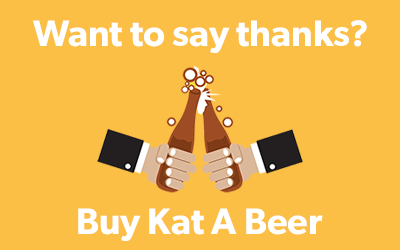Being yelled at is annoying.
Every Friday night on the main street of my city, there are one or two people who stand there with microphones ranting and raving about their religious beliefs.
Now, while I am totally on side with their right to have religious beliefs, I don’t think many people are actually affected by what they say. Maybe the occasional drunk interacts with them, or an atheist looking for a fight, but I think on the whole most people just pass them by.
People don’t pay attention, in fact, they’ll cross the street to avoid it.
At best, these people get ignored. At worst, they get open hostility. They probably yell at thousands of people over many weeks (perhaps even months) before they get one person who is genuinely interested in what they have to say.
That is an abysmal conversion rate.
Paying for a crowdfunding promotional service is like paying for someone to yell about your crowdfunding project on a Friday night.
Most of these services say they will tweet your link to their many thousands of followers, or publish an article about your project on a site dedicated to crowdfunding.
But the fact is, those eyes can be bought. And even if they are genuine, how long would you keep reading about every Tom, Dick, and Harry’s project when you know that the only thing Tom, Dick, or Harry have really done is pay the promoter $49?
Is it relevant?
Do you care about a new album from a band you’ve never heard of as much as a new gadget, or a community project on the other side of the world? Because a dedicated promotion service will take money from each of those projects, and put it out via the exact same microphone.
You need to find an interested and engaged audience.
“People who like crowdfunding” is not the audience you should be targeting.
You need to think about why your backers will want to fund your project, and consider who those people are. Then, you need to go and find them where they already hang out.
Drunks, lovers on dates, teenagers at an ice cream bar, and friends out for a burger and a movie are not the ideal audience for the preacher, and Friday night is not the right time. There are better ways to reach people who want to hear the message, and who will respond favourably.
Because on the other hand, on the same street just a few hours earlier, a group of Hare Krishna dance up the road, singing and smiling. As everyone is vacating the office, excited for the weekend, they are greeted by a group of people so happy they are dancing and singing about it.
I have friends who actively look forward to seeing the Friday-afternoon Hare Krishnas. And I see people talking to them, interested in why they are so happy about life.
Pick your time, place, and message.
Think about using your promotional budget on hiring a professional PR person.
Professional PR people come with existing networks and connections. They know how to get your campaign in front of the right audience at the right time, with the right message.
They help you to form a strategy, then execute it by getting you in front of journalists, producers, bloggers and reviewers.
If you’re going to hire a professional, then there a few things to consider.
It might cost more, but people will pay attention to what you have to say.
90% of what you are paying for with a PR person is who they know. PR is about relationships, so you want to research and find PR professionals who:
- Have experience in your category – for example, there’s no point hiring a music publicist to promote your new technology product.
- Have experience and contacts with the types of sites you will want to be featured on – make a list of places you’d like to be covered. When interviewing a publicist, ask them where they think they could get you featured. See whether your list and their list are at all similar.
- Can demonstrate the results they have achieved for other clients.
And try to engage on a % basis. You may need to pay some of the fee up front, but at least half of it should be based on how well their coverage converts into pledges.
Which is better than paying for zero-conversion.
I’m yet to hear about a dedicated crowdfunding promotion service that actually works – and certainly not any service that costs less than $200.
But I’m always interested in more data. So if you’ve spent money on promoting your crowdfunding project, I’d be really interested in knowing what worked, and what didn’t work for you.
Leave a comment below and tell me about your experience!




















Definitely what doesn’t seem to work anymore is sending out a blanket press release. Journalists are completely overwhelmed. Much better to target a smaller list of journalists who would actually be interested in your info and contact them one at a time. Yes, it’s a lot of work, but it does work.
And contacting bloggers and podcasters is just as good. They need good guests for a targeted audience.